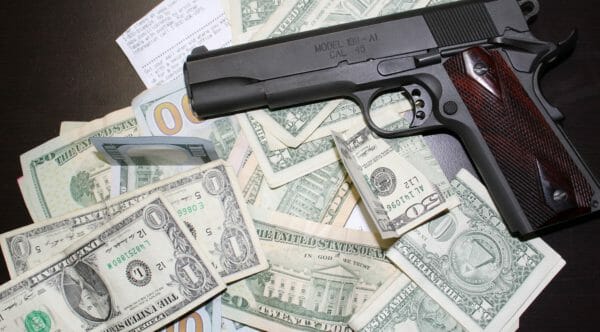
“Discover Financial Services, a provider of credit cards, told Reuters it will allow its network to track purchases at gun retailers come April, making it the first among its peers to publicly give a date for moving ahead with the initiative, which is aimed at helping authorities probe gun-related crimes,” the news agency announced last Friday in an “exclusive” report.
“We remain focused on continuing to protect and support lawful purchases on our network while protecting the privacy of cardholders,” Discover told Reuters. “We were following the industry for consistent implementation.”
“While the codes will not show specific items purchased, some Republican politicians have spoken out against the move, arguing it could violate the privacy of U.S. citizens lawfully buying guns,” Reuters notes.
Not just Republican politicians. While two dozen state attorneys general have warned “the CEOs of credit card giants Visa, American Express, and Mastercard” against implementing the codes, much of that has been driven by the demands of gun-owning constituents. AmmoLand writers, as well as other gun interest publications, have been on top of developments since they first became known, as have all the major “gun rights” groups.
But if the merchant codes don’t go to the SKU (stock keeping unit) level and identify specific items purchased, some may question what the big deal is. For that, look to the proponents of the codes and how they have announced they intend to use them.
“Banks are developing technology to identify potential mass shooters, according to a CEO backing the push to get credit-card companies to more closely track gun purchases,” Daily Business Review/Bloomberg News (!) claimed in November. “Detection scenarios’ are in the works that, if triggered, would prompt banks to file a Suspicious Activity Report to the Treasury Department’s Financial Crimes Enforcement Network.”
When law enforcement makes assumptions and suspects that someone may be armed and dangerous, what can happen was just acted out in North Carolina: A SWAT team lit up an unarmed man complying with its commands.
It’s fair to wonder if Discover’s risk management department has considered what the company’s liability would be should one of their “Suspicious Activity Reports” be the catalyst for a similar series of unfortunate events. Trying to excuse that by saying reports are made on other “suspicious” transactions doesn’t alter the fact that when guns are assumed to be prominent factors in an encounter, the danger level goes up.
DBR/Bloomberg’s ”go-to” source for its gushing press release masked as a news report was Amalgamated Bank Chief Executive Officer Priscilla Sims Brown. She has been touting for months what could also be described as Department of Pre-Crime “snitchware” to any media outlet that will lend her its megaphone. And relevant to note, per The New York Times, Amalgamated, majority owned by Workers United, “has aggressively carved out a position as the left’s private banker, leveraging deep connections with the Democratic establishment.”
As pointed out in a prior AmmoLand article, Workers United is a Service Employees International Union (SEIU) affiliate, which, per The Washington Free Beacon, “rakes in millions from Dem campaigns, liberal orgs.” And the SEIU, just to be clear, has organized rallies and marched in solidarity with communists.
A (disputed) quote about capitalists selling rope comes to mind.
For its part, Discover, at this writing, appears to be keeping a low profile about the new merchant category code (5723) on its press release page and on its Twitter feed. Perhaps that latter forum will change as more gun owners become aware of its part in the unauthorized feeding of its customers’ financial transactions to the feds. And perhaps blowback will involve more than disapproving comments.
Because the reality is, any gun owner who does not cancel his Discover card is giving aid and comfort to the enemy. Any FFL who accepts them is willfully giving up customer information.
In this case, and seeing as how the financial industry seems overwhelmingly committed to banking on disarmament, making purchases using cash seems prudent if one doesn’t want a transaction to trigger special government attention.
That seems like the kind of sentiment the far-reaching National Shooting Sports Foundation (NSSF), the firearms industry trade association, could influence — if it wanted to. Combined with the warned actions by the above-cited attorneys general and support from politicians beholden to gun-owning voters, other credit card companies that “declined to comment to Reuters on what their schedules for introducing the new code are,” may see what a can of worms they’re needlessly opening.
Because it’s not like any of this will stop “mass shootings,” especially where they’re most likely to occur. Those serious about reducing those would do well to instead focus on so-called “gun-free zones.”
About David Codrea:
David Codrea is the winner of multiple journalist awards for investigating/defending the RKBA and a long-time gun owner rights advocate who defiantly challenges the folly of citizen disarmament. He blogs at “The War on Guns: Notes from the Resistance,” is a regularly featured contributor to Firearms News, and posts on Twitter: @dcodrea and Facebook.

from https://ift.tt/swzDA7B
via IFTTT

No comments:
Post a Comment